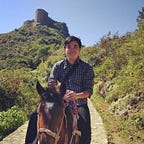Indonesian 30-Day Language Challenge: Day 6
Video number 6 is here! It’s another long one. The topic for today was: challenges encountered during language studies.
Translation and commentary after the video:
(By the way, the full archive of videos can be found here.)
Hi everyone, what’s up? I’m back again with a new video, the sixth video this month… the month of my thirty-day Indonesian language challenge. And today, I’m recording this video in the afternoon, not at night, because my jury duty at the courthouse has already ended, earlier than expected, and tonight I’m going to a language exchange event, which I mentioned yesterday. So I have a bit of time between the two events… between jury duty and the language event, so I think I can record a video during this time.
Okay, today’s topic, according to our schedule, is “difficulties in language learning”, that is, difficulties I encounter when studying various languages.
Okay… I think the biggest difficulty I have when studying languages is… hmm… maybe it’s… maybe because it’s easier for me to learn languages than it is for a lot of other people… compared to other people… but I also face various kinds of challenges when I study languages as well, like… hmm… the biggest difficulty might be finding opportunities to practice languages in real life. Because… I’ve already said that New York City is a big city with lots of people and a lot of languages, but there are some that are more… represented?… spoken… known than others.
Well, the problem with squeezing in a recording session in the afternoon is that I didn’t actually prepare what I was going to say beforehand. At all.
I can’t find a good equivalent for “represented” in this context — “spoken” (diucapkan?) and “known” (diketahui)are fine too.
For example, when I was studying Swahili two years ago, I studied it independently, on my own, without a teacher, without taking a class, but the hard thing was that there aren’t that many people who speak Swahili in this city, compared to Spanish, or Russian, or even French. There are way more people who speak these languages than Swahili. For that reason I still don’t speak Swahili very well, and I’m still waiting for a change to “level up” in it. Because I can already read a lot that’s written in Swahili, but I’ve yet to have a real conversation in this language.
“Independent” can just be independen, or bebas. “Course” can be kursus, which was my guess.
And now I’m facing a similar challenge with Indonesian, because it’s also a less-well-known language in this city, and in this country, all of the USA, actually. Therefore I need to look for more content from the internet, read more and listen [to more] in order to compensate for the shortage of people who speak Indonesian here in my city.
“Similar” is mirip. “To compensate” (counterbalance, offset) is mengimbangi.
Okay, and… another challenge might be… learning words. Because every language has a lot of words, and you need to learn a lot of words in order to be able to speak a given language, and I think learning vocabulary is harder than learning grammar, because grammar is… limited, or finite, much more limited than all the words in a language.
“Limited” and “finite” is terbatas. “Vocabulary” (instead of just “words”) is kosa kata.
What’s also very hard is the fact that grammar has a logical system, which might have irregularities, but ultimately it’s a system with a certain logic. And vocabulary usually has much less logic, and it’s harder to remember words in a language. But — if you already know another related(?) language, close to the one you are learning now, there might be a lot of connections between the words in these two languages. For that reason, when I’m learning Indonesian for example, I can use my knowledge of Arabic, Sanskrit, and a bit of Chinese too, to simplify my studies too.
“Ultimately” is akhirnya.
“Related” is terkait (which I should know from using Spotify in Indonesian — from “Related artists”) or berhubung.
Memudahkan, which I made up during the video, I one correct way to say “simplify” or “make easier”.
Okay, wow, today’s video is very long, once again, and I have to stop now, right away. Thanks for watching, and see you tomorrow. Bye.
